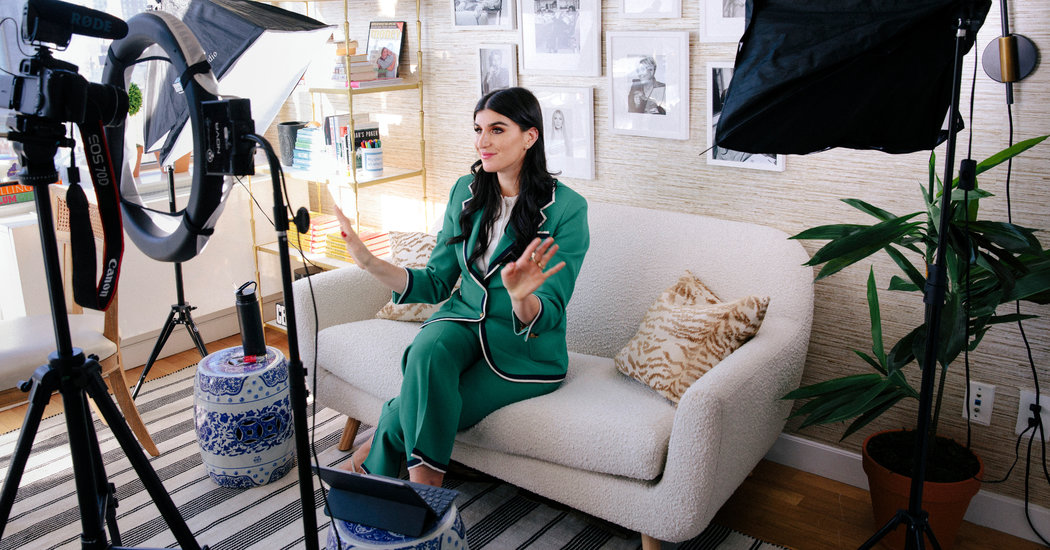
Finance memes are still niche on Instagram; @MrsDowJones has yet to break 100,000 followers, but along with accounts like @Litquidity and @finance_god, it’s helping define the “finfluencer” (that’s financial influencer) category. Most of those accounts are anonymous, and according to Institutional Investor magazine, many of them are run by people who work in the business. For them, memes are a way to commiserate with fellow bankers, especially those contending with the long hours of summer internships and first-year analyst positions.
Ms. Sacks, on the other hand, has never worked in finance. In fact, despite growing up in an environment where she might have learned, until two years ago, she didn’t even know the difference between a traditional retirement account and a Roth.
She grew up on the Upper East Side of Manhattan; her father worked at Goldman Sachs. But wealth management, as she saw it, was the domain of men. “I’ve always been creative and had a big sense of humor,” she said in a recent phone interview, “and those aren’t qualities you think of when you think of an ideal worker at an investment bank.”
After graduating from Wesleyan in 2013, Ms. Sacks worked as a page for the “Late Show,” worked the front desk at the fitness studio SLT and nannied. She was living month to month with nearly no savings.
Then, in 2017, she was accepted to a residency at Above Average Productions, the digital content arm of Lorne Michaels’s production company. The job would pay her an annual salary of $43,000 plus benefits, like a 401(k).
All of a sudden, Ms. Sacks said, “I was being faced with the financial decisions of a full-time employee,” like how much federal income tax she’d like to have withheld from her paycheck and whether she would be interested in putting some of her money in a growth account.
“I didn’t know the answer to any of the questions,” she said. “So, I went home and did what any self-respecting millennial did: I went on YouTube.”
Ms. Sacks wanted to learn about wealth creation, but “the only videos that were available to me to learn about these subjects were these 12-minute-long, unedited disasters of men with no charisma and no point of view,” she said. “They were literally writing on whiteboards with their back to the camera. It was so bad and so boring. And it was all men.”
“All the women were giving personal finance advice, and the Wall Street lingo was left to the guys,” she said. “The girls were the ones telling you to buy a crockpot and itemize your checks.”
Six months after joining Above Average, she said, Ms. Sacks was laid off. At that point, she also had a baseline understanding of investments, thanks to Google. She decided to create a digital brand of her own, based on her research, which she thought could be a more stable source of income than the patchwork of jobs she’d had in her early 20s.
“When I got dumped by Above Average, I never wanted to put my financial well-being into anyone else’s hands again,” Ms. Sacks said. “I didn’t want to have to rely on companies, or a brand that could cut the cord on me.”
She uses her family’s background as a teaching tool as well. She thinks it’s this outsider’s view on the inside that helps give her an edge. In a recent video, she details “rules only rich people know” about money.
“My goal is to create inclusivity,” she said. “If I grew up so close to this world and still felt marginalized, think how much worse it is for everyone else.”
So she registered the handle @MrsDowJones and began racking up followers with posts written not in jargon, but “in the language I spoke,” she said. That meant a lot of humor and Kardashian references.
In the two years since she introduced her brand, Ms. Sacks has founded a successful finance-related book club, newsletter where she shares finance tips and news, and merchandise line, where she pedals merchandise such as J.P. Sonja Morgan hats and “I miss Janet Yellen” pullovers. She monetizes her social channels through branded content deals. This year, Ms. Sacks also began hosting monthly sponsored events for her followers where finance figures like Sallie Krawcheck, a former executive at Bank of America, and Bradley Tusk, a venture capitalist, spoke about their books and financial careers.
Ms. Sacks said it’s not just women she wants to help, but everyone who has been shut out of careers in finance and conversations about wealth creation. Though she has made a name for herself by eschewing personal finance, talking to some of her fans has convinced her to incorporate more basic money management tips into her posts. Many of her followers struggle with student debt and, like many Americans, don’t have the disposable income to play in the stock market.
“What I realized is that I was talking so much about investing, but you can’t talk about investing until people have money saved,” Ms. Sacks said. “So, I had to take a few steps back and be like, ‘O.K. let me get my audience out of debt real quick, then we’ll hop back into things after they have a savings.’” In 2020, she plans to release a curriculum covering the basics of personal finance.
That doesn’t mean she’s abandoning her brand’s roots.
“I’m not here to defend Wall Street,” she said, “but I’m here to bridge the gap so people don’t feel excluded. Wall Street makes people feel like outsiders. They have their own uniform, they have their own language they speak, they have specific places they hang out, publications they read. They’ve created a world for themselves that feels exclusive. We can get into the nitty-gritty of, ‘they’re evil, they hurt us,’ but I think no matter what, let’s give you the skills and the confidence to play in their field.”







